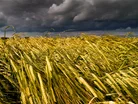Weather-hit European Crops Impact Global Food Supply Chains

Major food crops across Europe have been hit by extreme weather, and warnings issued around food supply and security.
The European Commission, the executive body of the European Union responsible for proposing laws and managing policies, has revised down production estimates for corn, barley and sunflower seeds across Europe.
The adverse weather conditions and subsequent downward revisions in crop yield estimates are likely to tighten the supply of cereals and oilseeds, potentially driving up prices in the next three to six months.
This could impact the profitability of food manufacturers and consumer goods companies operating in the region.
Excessive wet weather in many parts of Europe has hit the sowing, emergence and development of winter crops and hindered the sowing of spring crops.
Meanwhile, the global food industry is also grappling with supply chain disruptions as adverse weather conditions impact European crop yields, potentially driving up prices.
Europe's unpredictable weather patterns have long posed challenges for crop production, affecting global food supply chains and the bottom lines of major companies.
Widespread impact on key crops
Oilseeds under pressure
High temperatures are negatively affecting sunflower seed production, while excessive wet conditions have caused a downward revision to rapeseed yield estimates.
Water shortages in Bulgaria, Romania and Hungary have disrupted crucial flowering and early seed filling stages, resulting in significant yield reductions in sunflower seed.
These countries account for approximately 65 percent of the EU's sunflower production.
Cereals face multiple challenges
Excessive wet weather in Eastern and Northern Europe, combined with dry conditions in Southern Russia and Western Europe, has resulted in lower-than-expected wheat yields.
Major corn-producing countries, including Hungary and Romania, are experiencing extreme heat and water deficits, disrupting the critical pollinating stage of corn crops.
High moisture levels have also affected winter crops including barley, impacting grain weight and quality, in the biggest producing countries, such as Germany, Spain and France.
All together, this accounts for 60 percent of the EU's production.
Additionally, excessive soil moisture in the major wheat-producing countries of Germany, France, Poland, and Romania, is hindering fieldwork and raising concerns about a possible drop in quality.
Nestle’s response to weather conditions on European crops
In recent years, multinational corporations like Nestlé have invested in sustainable agriculture practices and diversified sourcing strategies to mitigate these risks.
However, the current season's extreme conditions are testing even the most robust contingency plans.
Nestlé, the world's largest food company, is proactively addressing the challenges posed by extreme weather conditions on European crop production.
The company has committed to sourcing 20% of its key ingredients through regenerative agricultural methods by 2025, increasing to 50% by 2030.
To achieve this, Nestlé is investing over 1bn Swiss francs (US$1.17bn) in its Nescafé Plan 2030.
The company is working with wheat farmers to implement climate-smart practices such as planting cover crops, reducing tillage, and decreasing pesticide use.
Nestlé is also diversifying crops through rotation and intercropping.
The company is also investing CHF US$1.2bn over five years to support farmers in transitioning to regenerative agriculture, providing technical assistance and financial support. These initiatives aim to enhance crop resilience and mitigate the impact of adverse weather conditions on European agriculture.
Kumar Amit, senior commodity specialist at The Smart Cube, a global provider of custom research and advanced analytics, advises: "Businesses relying on these crops for their production should adopt a multi-pronged strategy to mitigate the impact of the rising costs.
“Category managers must continuously monitor the impact of weather conditions, factoring it into their risk management and inventory planning. Equally, they should map supplier dependence and evaluate multiple sources for procuring goods.”
--------------
Make sure you check out the latest news at Food Digital, a BizClik brand
Featured Articles
Fresh investment supports TRACT in enhancing tools for sustainability in the food and agricultural sectors, aligning with EU regulations
The devastating floods in Spain have shaken up the global citrus supply, heightening challenges in the fruit juice drinks market
McDonald's has spent 40 years supporting students with scholarships & plans to continue, despite Robert F. Kennedy Jr.’s plan to Make America Healthy Again




